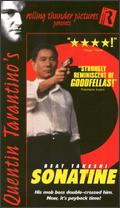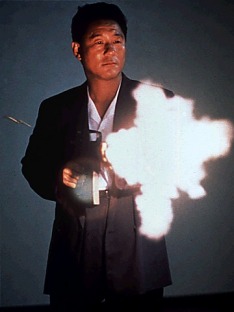 Grade:
B
Grade:
B
Starring Takeshi Kitano, Aya Kikumai, Tetsu Watanabe, Masanobu Katsumure,
Susumu Terajima, Ren Ohsugi, Tonbo Zushi.
Written and directed by Takeshi Kitano.
 Grade:
B
Grade:
B
Review by Carlo Cavagna.
In the Japanese films section at the video store, you might run across Sonatine, a Quentin Tarantino's Rolling Thunder Pictures Presentation. The tagline on the video box reads, "His mob boss double-crossed him. Now, it's payback time!" The press quotes trumpet that it's "strongly reminiscent of Goodfellas!" and "a brutal, brilliant crime thriller!" It would appear that you are in for some edge-of-your-couch suspense.
Wrong. Tarantino? Tarantino's movies are filled with conversation. Barely anybody speaks in Sonatine. I guess the video's backers were nervous about a more honest tagline, such as, "His mob boss double-crossed him. Now, he'll sit on the beach!" Well, OK, that tagline is unfair. But people who rent Sonatine expecting a rollicking action movie will undoubtedly dislike its slow pacing and Zen-line detachment. In fact, I haven't seen a movie with a more detached point of view in my life. And the ending would make a Hollywood studio executive apoplectic... as well as any audience used to Hollywood films.
A better tagline would be: "His mob boss double-crossed him. Now, he'll get
a small taste of what his life could have been." Takeshi Kitano, known to fans
as "Beat" Takeshi, is Murakawa, a successful veteran member of the yakuza,
a Japanese crime organization. But what does being successful in the yakuza
really mean? Everything is business. No matter how successful, Murakawa is still
expendable. All the gang members are. They die abrupt, violent deaths. None
are mourned. And none of them have any personal lives. Perhaps to convey how
disconnected Murakawa is from his emotional life, Kitano barely changes expression
for the entire film--sometimes to hilarious effect. 
When his boss sends Murakawa and his men to Okinawa to resolve a local gang conflict, Murakawa suspects that he is being double-crossed, but goes anyway. When Murakawa's suspicions proves to be correct, he and his men hide out in a beach house. At this point, Sonatine makes a left turn, as Murakawa's stay at the beach house turns into a summer vacation. Murakawa and his killers reconnect with the simple joys of life, and Murakawa even develops a relationship with a young woman. But Murakawa cannot put off a confrontation with his boss forever.
When there is action, which isn't often, it is indeed brutal. But it comes in short, precise bursts. It's not exciting. It's not intended to be. It's stark and unromanticized, and it's typical of Kitano's economical style. He doesn't give you slow motion shots of the hero jumping from a moving vehicle. He doesn't give you hyperkinetic banter. Primarily a visual director, Kitano simply allows scenes to unfold, choosing to let the camera run uninterrupted for long stretches of time. Therein lies the film's beauty.
The ending is a surprise that may be initially unsatisfying, but the more you think about it, the more it makes sense. Kitano isn't just telling a crime story; he is making a philosophical statement that makes particular sense when you consider it in its cultural context. Some have said that Sonatine is pointless, but I believe Kitano makes his point quite eloquently. This emotionless, nihilistic film is saying that life is beautiful, fleeting, and too easily thrown away.
Review © July 1999
by AboutFilm.Com and the author.
Image © 1999 Miramax. All Rights Reserved.
Send us a comment on this review. We'll post a link to the best comments!